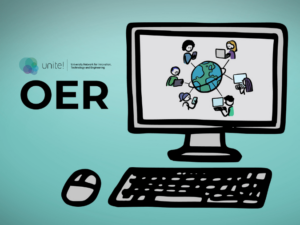Quelle: Sandra Schön Autor: sansch
So ein OER-Workshop ist für die Teilnehmer*innen ja schon immer sehr herausfordernd – Erst bekommen sie mitgeteilt, dass sie einiges bisher zu locker genommen in Sachen Urheberrecht und dann ist einiges rund um offene Lizenzen auch nicht so ganz trivial, auch wenn OER eine gute Lösung ist. Da entsteht dann oft eine gewisse Schwere. Ich habe es schon mal ausprobiert und nun für eine Weiterbildung mit Birgit Aschemann (Conedu) noch einmal überarbeitet, wie man methodisch im OER-Workshop auch schnelle Erfolge und ein kleines Highlight erreichen kann.
Aufgabe: Wir erstellen ein Mini-OER: 3 Tipps zum Thema OER
1. Schritt: Was sind unsere 3 Tipps?
Mit Hilfe von https://idea.kits.blog ist blitzschnell eine interaktive Sammlung möglich: Frage eingeben, Link im Chat der Video-Konferenz eingeben, um Vorschläge bitten und gleich auch parallel um Abstimmungen. (Ich vermute, das Tool ist bei uns aufgepoppt, weil Nele Hirsch es vorgestellt hat. Falls nicht, hat sie mir schon soo viele Tools vermittelt, dass ihr Name nicht oft genug genannt werden kann  )
)
2. Man kann parallel schon das vorbereitete „Gerüst“ / Design der OER vorstellen.
Wir haben das mit Google Doc gemacht, (https://docs.google.com/presentation/d/1ipsPcpEzPtlC12gCTGXx30_MzimPBgy1b93tLl8gB6M/edit?usp=sharing) aber das Tool spielt keine Rolle.
3. Absprache über gewählte Lizenz und Attribution
Wie bei jedem OER-Projekt erfolgt eine kurze Abklärung, ob die Nutzung der gewähten Lizenz und Attribution für alle Beteiligten in Ordnung geht – mit dem Hinweis, dass das immer notwendig ist und bei größeren Projekten auch schriftlich erfolgen sollte.
4. Finalisierung der OER
Die Top 3 der Umfrage werden übertragen, ein Screenshot gemacht (könnte natürlich auch ein Export sein)
5. Veröffentlichung und Teilen
Nicht „professionell“, aber schnell: Die kleine OER wird bei Twitter geteilt (am geteilten Bildschirm der Lehrenden nachvollziehbar für alle), der Link kommt in den Kurs-Chat (https://twitter.com/sandra_schoen/status/1783493937635737995).
Voilà. Tat nicht weh. Vielleicht nicht perfekt, aber ein weiterer Beitrag für mehr OER und offene Bildung und ein kleines Highlight und Impuls, dass OER-Produktion doch gar nicht sooo kompliziert ist.
Für den Antrag beim Guiness Buch der Rekorde: 11 Minuten haben wir gebraucht.



